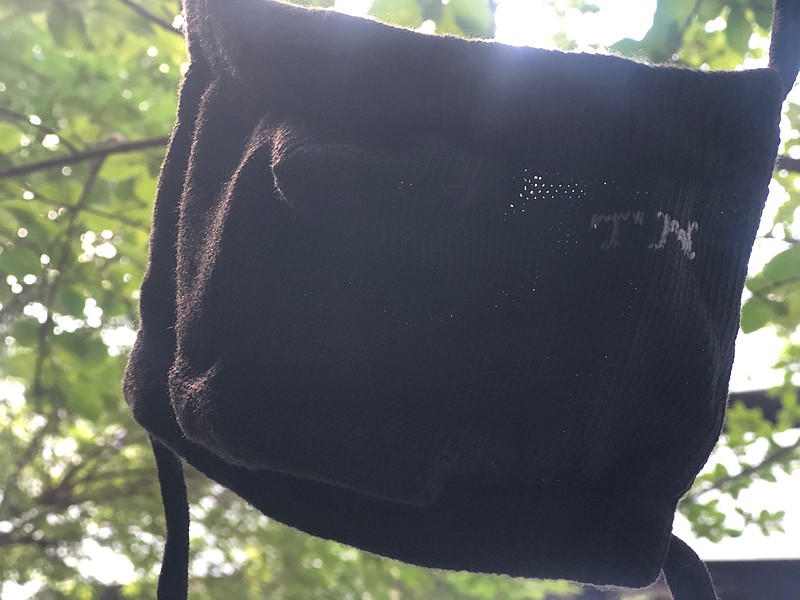Remember those breezy black sock masks with the TN on them that Tennessee Gov. Bill Lee ordered up with an $8.2 billion, no-bid contract? They've been recalled.
Well, not recalled, exactly, though the Tennessee Black Caucus is calling for a recall.
The state of Tennessee has now suspended the distribution "until further notice" of the sock masks that first stirred controversy because the weave was so porous you could see through them.
It turns out that the silver-something antimicrobial stuff touted by the state to make these washable masks help stop the spread of the novel coronavirus is registered by EPA as pesticide. We say silver-something because between the state and the maker, the story about exactly what silver-something is in the mask has changed now at least three times.
All of this has the Tennessee Black Caucus also calling for a "full investigation" into the COVID-19-prompted face coverings, and the caucus is right to make that demand.
Caucus Chairman G.A. Hardaway, D-Memphis, said Tuesday that Lee "now needs to recall this obviously defective product and take it out of the hands of the general public. We know that many people in some of our more disadvantaged communities took advantage of the giveaway and now we need to protect them from the protection they believed we were providing for them."
The mask controversy erupted after a television news station in Nashville began looking at state claims that despite the porous weave, the mask was effective because, according to a state unified command group official, the masks are made with terry polyester and treated with Silvadur, a non-toxic silver antimicrobial good for 25 industrial washes.
The Nashville station found that Silvadur is a Dupont product registered with EPA as a pesticide. (The Times Free Press found the registration document on the EPA website, and it warns the product can "cause irreversible eye damage, cause skin burns" and that it is "harmful if swallowed" and "harmful if absorbed through skin." The document from 2017 also says Silvadur is "harmful if inhaled.")
Hamilton County on Saturday, along with several other counties in the state, said they would no longer distribute the mask. Hamilton County health officials asked residents to stop using the state-distributed face coverings.
Then the state said there was confusion, and the sock mask maker sought to clarify the story.
The North Carolina-based Renfro Corp., which makes the masks at a Cleveland, Tennessee, sock manufacturing plant that geared up to make masks after COVID-19 began to spread here, told reporters Tuesday that the confusion stemmed from an initial state health department report that identified the chemical simply as Silvadur. Renfro, in a statement, said what is actually used in the masks is a chemical called Silvadur 930, which is a less harmful version of Silvadur - one that recently received an "emergency use authorization" approval from the FDA.
The Times Free Press found that the emergency use approval was issued on April 24 - less than six weeks ago.
We also found, in another agency document dated June 29, 2016, that Silvadur 930 also has been an antimicrobial that is registered with the EPA as a pesticide for "non-food contact uses in industrial and household woven and non-woven fibers, such as bedding, apparel, footwear, wall and floor coverings, carpets, draperies, wiping cloths, brushes, filters, insulation, tents, awnings and tarps."
A Renfro spokesperson on Tuesday said in an email that Silvadur 930 has been "demonstrated to be harmless to human health when used as intended."
Then things got confusing again.
Renfro President and CEO Stan Jewell said in a Times Free Press interview Tuesday that the actual chemical is a DuPont variant called Silvadur 360 FLEX.
Maybe these are all just different dilutions of this chemical. That would be reasonable. The safety even of aspirin, after all, is in the dosage. Take one, you're fine. Take two, you're probably fine - unless you're on a blood-thinner. Take half a bottle, and you're not fine. But usually you know what you're getting with aspirin.
At any rate, the state and the folks who've already been wearing these masks - whether for five minutes or five 8-hour workdays - deserve not just a few changing stories but, as the Tennessee Black Caucus has demanded, a full investigation.
For now, the state's decision to stop distributing the masks was the only smart thing to do. But it's also the least we should expect.
